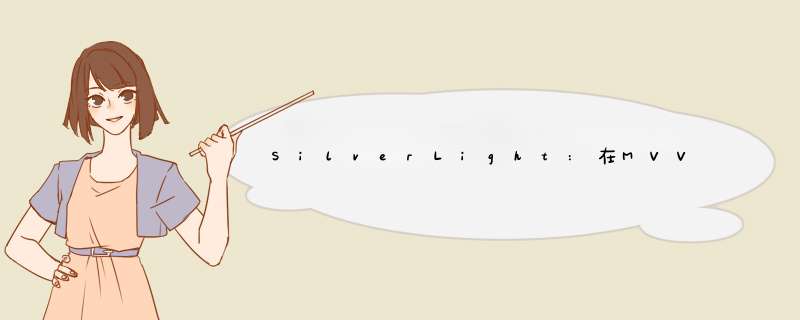
在开发Silverlight项目时,如果使用了MVVM架构时,可以实现业务逻辑与界面的完全分离。事件可以通过实现接口ICommand达到效果,比如:button控件,如果要实现单击效果时,可以通过绑定Command即可。
但是如果需要实现鼠标离开button事件怎么实现呢,就这是今天需要讨论的问题=》多事件实现
项目架构如下图:
我今天主要用button做实验,来实现button控件的单击事件和鼠标离开事件。这在非MVVM架构下非常容易实现。但是在MVVM架构, 我们需要引用System.windows.Interactivity.dll,此动态库存放的位置为C:/Program files/Microsoft SDKs/Expression/Blend 3/Interactivity/librarIEs/Silverlight/System.windows.Interactivity.dll
关于System.windows.Interactivity.dll的介绍,请查看http://msdn.microsoft.com/zh-cn/library/system.windows.interactivity(v=Expression.40).aspx
通过引用动态库,然后在MainPage.xaml中实现button的两个事件。代码如下:
MainPage.xaml
< UserControl x:Class = " MoreEvent.MainPage "xmlns = " http://schemas.microsoft.com/winfx/2006/xaml/presentation "
xmlns:x = " http://schemas.microsoft.com/winfx/2006/xaml "
xmlns:d = " http://schemas.microsoft.com/Expression/blend/2008 "
xmlns:mc = " http://schemas.openxmlformats.org/markup-compatibility/2006 "
@H_404_86@xmlns:i @H_404_86@= " http://schemas.microsoft.com/Expression/2010/interactivity "
xmlns:local = " clr-namespace:MoreEventviewmodel;assembly=MoreEventviewmodel "
mc:Ignorable = " d "
d:DesignHeight = " 300 " d:DesignWIDth = " 400 " >
< UserControl.Resources >
< local:MoreEventsviewmodel x:Key = " k " />
</ UserControl.Resources >
< GrID x:name = " LayoutRoot " Background = " White " DataContext = " {StaticResource k} " >
< button Content = " 测试多事件 " WIDth = " 70 " Height = " 25 " >
@H_404_86@< @H_404_86@i:Interaction.Triggers @H_404_86@>
@H_404_86@< @H_404_86@i:EventTrigger Eventname @H_404_86@= " Click " @H_404_86@>
@H_404_86@< @H_404_86@i:InvokeCommandAction Command @H_404_86@= " {Binding BtnClick} " @H_404_86@/>
@H_404_86@</ @H_404_86@i:EventTrigger @H_404_86@>
@H_404_86@< @H_404_86@i:EventTrigger Eventname @H_404_86@= " MouseLeave " @H_404_86@>
@H_404_86@< @H_404_86@i:InvokeCommandAction Command @H_404_86@= " {Binding MouseLeave} " @H_404_86@/>
@H_404_86@</ @H_404_86@i:EventTrigger @H_404_86@>
@H_404_86@</ @H_404_86@i:Interaction.Triggers @H_404_86@>
</ button >
</ GrID >
</ UserControl >
那么viewmodel和ICommand的实现非常简单,两个文件的代码如下
MoreEventsviewmodel.cs
using System;using System.Net;
using System.windows;
using System.windows.Controls;
using System.windows.documents;
using System.windows.Ink;
using System.windows.input;
using System.windows.Media;
using System.windows.Media.Animation;
using System.windows.Shapes;
namespace MoreEventviewmodel
{
public class MoreEventsviewmodel
{
public MoreEventsviewmodel()
{
}
private voID MouseLeaveEvent( object obj)
{
MessageBox.Show( " 测试鼠标离开事件 " );
}
private voID BtnClickEvent( object obj)
{
MessageBox.Show( " 测试单击事件 " );
}
public ICommand MouseLeave
{
get { return new MoreEventCommand(MouseLeaveEvent); }
}
public ICommand BtnClick
{
get { return new MoreEventCommand(BtnClickEvent); }
}
}
}
MoreEventCommand.cs
using System;using System.Net;
using System.windows;
using System.windows.Controls;
using System.windows.documents;
using System.windows.Ink;
using System.windows.input;
using System.windows.Media;
using System.windows.Media.Animation;
using System.windows.Shapes;
namespace MoreEventviewmodel
{
public class MoreEventCommand:ICommand
{
Action < object > _action;
public MoreEventCommand(Action < object > ac)
{
_action = ac;
}
public bool CanExecute( object parameter)
{
return true ;
}
public event EventHandler CanExecuteChanged;
public voID Execute( object parameter)
{
if (_action != null )
_action(parameter);
}
}
}
通过以上方法即可在MVVM实现多事件.通过这个件事,大家可以触类旁通,实现其它控件的多事件。希望对大家有用。
本文来自天神一的博客,原文地址:http://www.cnblogs.com/888h/archive/2010/12/08/1900621.HTML
总结以上是内存溢出为你收集整理的SilverLight:在MVVM中实现多事件全部内容,希望文章能够帮你解决SilverLight:在MVVM中实现多事件所遇到的程序开发问题。
如果觉得内存溢出网站内容还不错,欢迎将内存溢出网站推荐给程序员好友。
欢迎分享,转载请注明来源:内存溢出

 微信扫一扫
微信扫一扫
 支付宝扫一扫
支付宝扫一扫
评论列表(0条)